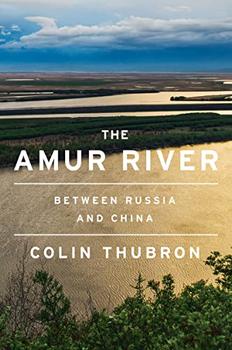Summary | Excerpt | Reviews | Beyond the Book | Readalikes | Genres & Themes | Author Bio

Between Russia and China
by Colin Thubron
We camp on a shoulder of firm ground. Beyond our firelight the air is cool and still, the forest utterly silent. We eat our mutton stew, and talk, while the sky fills up with stars. Sometimes the horsemen's faces lighten into wry smiles and laughter. They share some old affinity. In the dark their features and ages seem to converge, both born in the Year of the Horse (although they say this means nothing). Batmonkh interprets from the desultory gutturals and aspirants of their exchange. They tell stories of national victimhood: of a Russian robber-baron long ago, who stole Mongolia's gold along a road laid by Chinese slaves. 'Our ancestors told us this.'
Batmonkh gives a ghostly smile. From the vantage of our camp, under that glittering sky, he suddenly starts to talk of natural wonders, as if to replace the horsemen's legend with something stranger and real. Somewhere up there, he says, Titan, the moon of Saturn, has yielded the first signs of life in the solar system.
The horsemen nod silently. It is impossible to tell how this strikes them, or if it seems no more than a distant tale, like many others. It does not, after all, help feed their families, or the horses shifting round us in the night.
But Batmonkh is different. He has a wife and child back in Ulaanbaatar, yet his mind is filled with reflection and dreams. He looks like no Mongolian I've seen. He is dark-skinned and handsome, with large, swimming eyes. Slighter built than the horsemen, he seems at once lither and more vulnerable.
'People think that I'm Indian.' He speaks softly, although the horsemen cannot understand. 'My father is Angolan, you see, from southern Africa. My mother met him in Moscow during Soviet times, as Third World students.' He smiles at the term. 'And I am the result.'
Those had been the years, I remember, when Moscow's Lumumba University took in select students from less developed nations, many from Africa, and gave them a free education, steeped in Soviet ideals. I wonder: 'Where are your parents now?'
'My mother came back to Mongolia, but my father could not follow her. Our government would not allow it, an impoverished African country ...'
His mother had married again, he says, and had more children, while he gained a place at Harbin University and a degree in geography. 'But when I came back, good jobs were impossible to find. You needed a hook, and I had none ...'
I guess: 'A contact?'
'Yes.' His voice holds a spark of rebellion. 'It's a kind of corruption.'
I wonder aloud what prejudice festered back in Ulaanbaatar, and if his parentage had hampered him. For a long time he does not answer, then he says: 'No, I don't think so. It's not my colour. It's my family's obscurity. We don't know people. We don't have power.'
Sometimes in that first intimacy, he looks obscurely troubled and goes silent; then his smile returns with a kind of gentle apology. 'It was my grandfather who took my father's place, and brought me up,' he says, and I feel I already knew this. The old man had died a few days before our departure; Batmonkh had shared with me his funeral meats. Now he loads more branches onto our fire, stares at the flames. He says: 'I loved him.'
It happens suddenly. We come down in forest shadow, splashing over streamlets of recent rain. Pink rocks, swept down by meltwater in another age, press up from the alluvial earth. It is almost noon. To our south-east we see a blur of irregular mountains: the two-peaked mass of Mount Khenti, where Genghis Khan may lie. I cannot tell how far away it is. Then the terrain levels out and we go through lashing thickets, our heads bowed, advancing blind. Twice my riding helmet deflects the blows of low-hanging larch branches.
Then the scrub clears before a margin of feathery grass. And here, without warning, we come upon a trickle of water, a yard wide. The horses ahead have already crossed it, and are out of sight. I shout to Batmonkh: 'What is this?'
Excerpted from The Amur River by Colin Thubron. Copyright © 2021 by Colin Thubron. Excerpted by permission of Harper. All rights reserved. No part of this excerpt may be reproduced or reprinted without permission in writing from the publisher.
I always find it more difficult to say the things I mean than the things I don't.
Click Here to find out who said this, as well as discovering other famous literary quotes!
Your guide toexceptional books
BookBrowse seeks out and recommends the best in contemporary fiction and nonfiction—books that not only engage and entertain but also deepen our understanding of ourselves and the world around us.